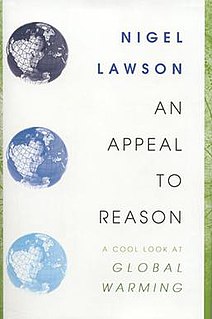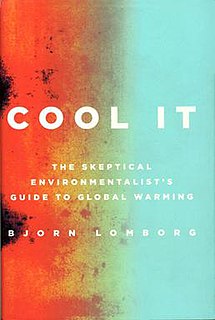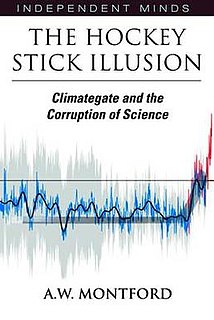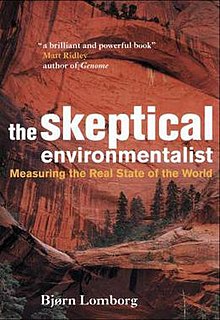 W
WAn Appeal to Reason: A Cool Look at Global Warming is a 2008 book by Nigel Lawson. In it, Lawson argues that global warming is happening, but that the science is far from settled. He opposes the scientific consensus as summarized by the IPCC. He also argues that warming will bring both benefits and negative consequences, and that the impact of these changes will be relatively moderate rather than apocalyptic. The book has been rejected by climatologists, including IPCC authors Jean Palutikof and Robert Watson as unscientific.
 W
WCool It: The Skeptical Environmentalist's Guide to Global Warming is a book by the Danish statistician and political scientist Bjørn Lomborg. The book is a sequel to The Skeptical Environmentalist, which in English translation brought the author to world attention. Lomborg argues that many of the elaborate and expensive actions being considered to stop global warming will cost hundreds of billions of dollars without the same return on investment, often are based on emotional rather than strictly scientific assumptions, and may have very little impact on the world's temperature for centuries. Lomborg concludes that a limited carbon tax is needed in the First World as well as subsidies from the First World to the Third World to help fight ongoing humanitarian crises.
 W
WThe Deniers is a 2008 book by Lawrence Solomon, a Canadian environmentalist and writer. Subtitled "The world-renowned scientists who stood up against global warming hysteria, political persecution, and fraud," the book draws attention to a number of scientists and others who, according to Solomon, have advanced arguments against what he calls the "alarmist" view of global warming, as presented by Al Gore, the Intergovernmental Panel on Climate Change (IPCC), the mainstream media, and others. The book is based on a series of columns Solomon wrote for Canada's National Post. It has been criticized for misquoting the scientists it featured.
 W
WHeaven and Earth: Global Warming – The Missing Science is a popular science book published in 2009 and written by Australian geologist, professor of mining geology at Adelaide University, and mining company director Ian Plimer. It disputes the scientific consensus on climate change, including the view that global warming is "very likely due to the observed increase in anthropogenic (man-made) greenhouse gas concentrations" and asserts that the debate is being driven by what the author regards as irrational and unscientific elements.
 W
WThe Hockey Stick Illusion: Climategate and the Corruption of Science is a book written by Andrew Montford and published by Stacey International in 2010, which promotes climate change denial.
 W
WAn Inconvenient Book: Real Solutions to the World's Biggest Problems is a 2007 political narrative written and edited by conservative commentator Glenn Beck
 W
WThe Real Global Warming Disaster is a 2009 book by English journalist and author Christopher Booker in which he asserts that global warming cannot be attributed to humans, and then alleges how the scientific opinion on climate change was formulated.
 W
WThe Skeptical Environmentalist: Measuring the Real State of the World is a book by Danish environmentalist author Bjørn Lomborg, controversial for its claims that overpopulation, declining energy resources, deforestation, species loss, water shortages, certain aspects of global warming, and an assortment of other global environmental issues are unsupported by statistical analysis of the relevant data. It was first published in Danish in 1998, while the English edition was published as a work in environmental economics by Cambridge University Press in 2001.
 W
WState of Fear is a 2004 techno-thriller novel by Michael Crichton, his fourteenth under his own name and twenty-fourth overall, in which eco-terrorists plot mass murder to publicize the danger of global warming. Despite being a work of fiction, the book contains many graphs and footnotes, two appendices, and a 20-page bibliography in support of Crichton's beliefs about global warming. Many climate scientists, science journalists, environmental groups, and science advocacy organisations dispute Crichton's views on the science as being error-filled and distorted.